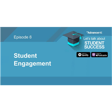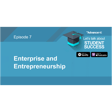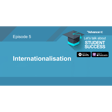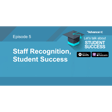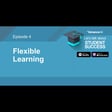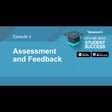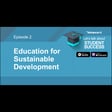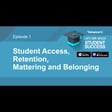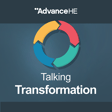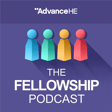Become a Creator today!Start creating today - Share your story with the world!
Start for free
00:00:00
00:00:01

Episode 9: Employability
In this episode of the "Let's Talk About Student Success" podcast, host Stuart Norton is joined by Bev Herring and Fay Short, co-chairs of the Medr Employability Community of Practice. In this season finale, they reflect on the collaborative, pan-Wales initiative that has brought together every higher education provider to tackle pressing questions around student employability, and Stuart also reveals the most popular biscuit in higher education today.
Transcript
Introduction and Series Overview
00:00:13
Speaker
Hello listeners and welcome to our podcast, Student Success Pod. I'm your host Stuart Norton and here we discuss the core thematic areas of student success. I do have to say it is a welcome to the last episode in our first series.
00:00:27
Speaker
And to today we are looking at a celebration of collaboration of ideas and the shared commitment that's been at the very heart of every conversation throughout the series. And this episode will not disappoint.
00:00:38
Speaker
No pressure there to my guests. Um,
Collaborative Initiative in Wales
00:00:41
Speaker
Over the past year, we have been working on a collaborative initiative throughout the whole of Wales that's brought together every higher education provider to tackle some of the sector's most pressing and exciting questions around employability.
00:00:54
Speaker
How do we future-proof our graduates in a labour market that's evolving faster than ever? What does it mean to deliver employability that's not only effective, but also ethical and sustainable? And how do we truly connect classrooms to careers in ways that work for students, staff, employers,
00:01:10
Speaker
and the wider Welsh economy. Through thought provoking symposia, hands on task groups and open space for dialogue, this project has generated not just insight, but also tangible innovation and a strong sense of shared purpose.
00:01:23
Speaker
What
Series Reflection and Future Outlook
00:01:24
Speaker
began as a network has become a genuine community, one that values collaboration over competition and believes in the collective power of Welsh higher education to shape opportunity. Today, i am therefore absolutely delighted to be celebrating this work in our season finale.
00:01:39
Speaker
reflecting on that journey so far and looking ahead to what comes next. And in order
Guest Introductions and Roles
00:01:44
Speaker
to do that, I'm joined by the co-chairs of the MEDA Employability Community of Practice Group, Bev Herron, who is Head of Careers and Employability at Aberystwyth University and the sub-lead of the Professional Development Integrated Employability Group for ADCAS.
00:02:00
Speaker
Bev, hello and welcome. Hello everyone. Thank you Stuart. It's really great to be here today. So as Stuart said, my name is Bev Herring. I am Head of Careers and Employability at Aberystwyth University.
00:02:13
Speaker
And also as Stuart said, I have leading roles advancing employability initiatives across Wales and nationally. co-chairing the Pan Wales Employability Community of Practice alongside Faye and contributing to national policy and professional development through my role with the AgCAS Integrated Employability Working Group.
00:02:34
Speaker
Fantastic
Understanding MEDA's Role
00:02:35
Speaker
and very pleased to have you Bev and a big warm welcome and also to you Faye, Professor of Counselling and Associate PBC of Employability at Bangor University and also co-chair of the Mehta Group.
00:02:48
Speaker
Hello, thank you Stuart. It's an absolute pleasure to be here chatting with you all today. Stuart said, my name is Faye Short. I'm a professor at Bangor University where I teach on the psychology programs and also run our masters in counseling.
00:03:05
Speaker
But one of my big roles is the Associate Pro Vice Chancellor for p employability at Bangor where we're leading on lots of employability initiatives seeking to embed employability and career development throughout all of our programmes at the university.
00:03:21
Speaker
And this work fits really nicely with the work that we're doing with the Pan Wales community of practice because it ensures that we're collaborating across Wales to and really enhance employability and bring together an integrative perspective on how employability can work across multiple different organisations.
00:03:42
Speaker
Perfect. a Thank you, Faye. um and and And I should say, as this is the MEDA employability group, um I should explain to listeners who MEDA are. MEDA is a Welsh government body, also known as the Commission for Tertiary Education and Research, and is the tertiary educational and Welsh government-sponsored body overseeing post-16 education and research in Wales.
00:04:06
Speaker
So MEDA, as the sponsoring body, actually bring and convene this group together, supported by Advance HE, um and chaired by our fabulous guests we have here today.
Biscuit Preferences – A Light-hearted Interlude
00:04:16
Speaker
But of course, it wouldn't be the podcast it is without our biscuit introduction.
00:04:20
Speaker
And did you know that Wales has its own traditional biscuit? They're called Aberforth biscuits, and they're said to date back to the 13th century and baked in the shape of a scallop shell. Ledin has it that they were first made to honour a pilgrimage to Santiago de Compostela in the northern part of Spain, proof that biscuits, like education, have always been about journeys and connections.
00:04:43
Speaker
So I'm going to ask my guests, as always, what their favourite biscuit is and the important question, whether they're a dunker or not. But I'm also going to throw in a third question, having visited both Aberystwyth and Bangor, which is why have I never been offered an Aberforth biscuit?
00:04:56
Speaker
I don't know who'd like to go first. Oh, Stuart, I feel terrible now because I've never even heard of that biscuit. So now I feel like i'm I'm not representing Wales appropriately. I've never heard of it, let alone tasted it or offered it to you on one of your visits.
00:05:13
Speaker
the Well, there there we go. I mean, we Welsh cakes at both, I believe. But, you know, a cake isn't a biscuit. We don't want to go back over our Jaffa cake stories. um But there you go. You've never. Bev, have you heard of an Abertholw Biscuit?
00:05:24
Speaker
I haven't. I haven't. Yeah, if you come to Arbistoth, it's generally Welsh cakes or Barabrith, so cake is the favoured area there. But yeah, certainly one to to look at and maybe integrate into our hospitality going forward.
00:05:40
Speaker
Well, who who would like to go first? What's your favourite biscuit then? yeah i I think I have a controversy here. It's not a Jaffa cake, but i I'm really sorry to bring this up, but My preferred biscuit is actually sometimes considered to be ah chocolate bar.
00:06:00
Speaker
I know, I know. I'm sorry about this. It is a Kit Kat. Ah, okay. And when I do dunk a Kit Kat. I prefer a four-fingered Kit Kat, not one of those chunky ones, but I will have a chunky one if there is no four-fingered biscuit Kit Kat.
00:06:17
Speaker
But I will dunk it. So my favourite biscuit is actually a chocolate bar. Well, you you are all forgiven. and And I say this because I've already publicly had to apologise to my co-worker, the the fabulous Vic Stevenson, senior consultant in education at Advance HE, because her favourite biscuit is a Kit Kat.
00:06:36
Speaker
And I said I did not believe that was actually a biscuit. I believed it was a chocolate bar and they can only be found in the chocolate bar aisle. But I had to therefore go and do research and actually is classed as a biscuit. um So you you are you are fully within your rights, Faye. And I Your dunking is noted and the KitKat will go down on the list of most popular biscuits. and We'll see who the winner is by the end of this series.
00:06:59
Speaker
Bev, over to you. Great, thank you. So I'd say much more of a cake person and I'm definitely a baker. So I love making cakes. ah They're one of the common puddings for my kids.
00:07:13
Speaker
But on a recent trip to South Africa, so sticking with the theme of travel and journeys, I have um i discovered and something called a buttermilk muesli rusk.
00:07:25
Speaker
which sounds unappealing, but is absolutely delicious, dunked in a steaming cup of hot coffee. So that was for me a turning point around biscuits.
00:07:38
Speaker
I did bring some back and share them with my um team who were at first very disappointed to see that I brought back muesli buttermilk rust, but actually were con converted very quickly.
00:07:50
Speaker
and So yeah, for me, it's it's the rust. I think it's a biscuit. absolutely yeah yeah it it was a bit of a game changer but I mean maybe it's verging on breakfast as well with muesli included I don't know but yeah no no that's fine i think I think we can have that one in there and I like finding out about these new biscuits that I've never heard of before and as ever colleagues you are more than welcome to send your biscuits into Advance HE care of Stuart Norton um Without any further ado, it's ah it's probably best to go on with the podcast.
Roles in MEDA Employability Group
00:08:21
Speaker
um and And I think, you know, this is last in the series. It's a special edition. and
00:08:26
Speaker
ah The work of the Meta Employability COP group, Community of Practice, um your your roles, what what are they? You know you you are national endeavour, national ambassadors. um tell our Tell our listeners a little bit more about your roles and what that's entailed.
00:08:43
Speaker
Yeah, okay. So we were formed in May 24. So um around that time, we've had one year in post. um And we're on a two year tenure.
00:08:55
Speaker
So it's really exciting to step into this role to think about possibilities. of what we could achieve. We've already been working with Advanced HE for a good year or two, and starting off with a survey, and looking at how we embed employability across our institutions, recommendations, and then a a range of symposia.
00:09:16
Speaker
So our role really was to bring together our community, I'd say, Faye, Yeah. um And that's really around bringing academic and professional service roles together to complement each other. um And I think we both have lots of influence um within this field, the AIDS engagement. So um our roles have significant impact with Faye being academic and myself being more professional service
Language Alignment in Employability
00:09:47
Speaker
orientated um we have that ability i think really to bring people together and really think about that collaborative element um and and how we can really draw out um key direction for the group vaguely yeah i completely agree with everything you said bev i think there's two sides to our roles there's the the practicalities so we obviously have regular meetings with advance he with
00:10:15
Speaker
meta We look at organising symposiums, we look at exploring funding opportunities so that we can bring funding to the group to enable them to take on board projects. So this year we've run two really exciting projects, one looking at the language of employability, the other looking at sustainability and employability.
00:10:35
Speaker
and those things were funded by MEDA. So we've looked at some really exciting different things that we can bring in. And there's that practical element that on the ground, what can we do?
00:10:47
Speaker
But there's also the inspiration that Stuart mentioned and the collaboration that you mentioned, Bev, that how do we inspire and encourage all of the practitioners or everybody involved in employability, whether that's people in careers services, whether it's staff leading, academic staff leading on employability, or staff in schools, in departments, teaching their courses and trying to embed employability.
00:11:13
Speaker
How do we bring all of those people together so that they can really work in a collaborative way to enhance employability across Wales and beyond that globally?
00:11:25
Speaker
Yeah, that that that sense of ownership is so important as well, isn't it? And and and in full disclosure, and I've operated in the Secretariat role for this group, which has been a real honour. As Bev has indicated, the that I think it was 2022, the first employability in the curriculum report was published. and We'd worked with Welsh institutions to provide case studies.
00:11:47
Speaker
And so much has gone on. And I think you know the support of MEDA has been very, very important, having the Funding Council support for the work. um But Faye, you just mentioned the funding opportunities there in addition, and not that that I would have forgotten these at all, but these these are still to be published. And you both were respective um leads for the group. So would would you care to tell a little bit more about that to our listeners? Because this is something that's going to be coming out, being published um I believe around October time and again will be made freely available for for across the wider sector as well.
00:12:24
Speaker
Yeah I think it's it's really important to be able to share this and to encourage people to read those publications when they go live. So we had two groups, one group was focusing on the language of employability and the other group was focusing on sustainability and employability and I was involved in the language project.
00:12:43
Speaker
In the language project we were really interested in how language is used by universities, maybe in their skills, their graduate attributes, the way they talk about employability and what students are expected to leave their degrees with.
00:13:01
Speaker
And also the students, what they understand that language to be. How do they interpret these skills, names, these resilience and teamwork? How do they understand those words?
00:13:12
Speaker
And really importantly, employers. What do employers use as keywords? Because it's no good as teaching students to articulate their skills in one way if when they go into a job market, if they go into an interview, if they're writing their CV, a cover letter, they're not actually articulating it in a way that employers understand.
00:13:30
Speaker
So our question for that group was all around how is the language of employability aligned between these different stakeholders? And this followed on from some previous work that I'd done with looking at employability language and exploring the different understandings of that language.
00:13:49
Speaker
So this group came together and they conducted a survey looking at particular job adverts. So they created these job adverts using AI, which I'm sure we're going to come back to generative AI throughout this this podcast. I'm sure it will crop up occasionally, um but they use generative AI to create job adverts Focusing very much on the skills that they're embedding and the language that they use. So they drew on existing job adverts that are out there in the world to create these job adverts.
00:14:22
Speaker
And then they asked people to read them, to identify skills, to to demonstrate their understanding of what these job adverts were asking for. So it's a really interesting paper that's exploring the language of employability and providing us with a bit of an insight into how these different stakeholder groups really understand language when they're talking about skills, graduate outcomes, graduate attributes and the abilities of our graduate students.
00:14:50
Speaker
Perfect. Thank you, Faye. And just before I come to you, Bev, to talk about the sustainability one, ah you mentioned that that followed on from your previous work, Faye. That's the work you undertook with the QAA, wasn't it? and It is indeed, yes. So that was a ah three-stage process.
00:15:04
Speaker
So that work was a really interesting set of surveys where we asked students, we asked academic and professional services staff in universities, and we asked employers to rank order different graduate attributes and skills. So what did they think was most important? What did they think was least important?
00:15:24
Speaker
And some of them were the same. So in some of the skills we found um similarities across all of the different stakeholders, they all thought they were equally important. And then we asked them how much they felt for students, they felt they were being trained in that skill, how much they felt to as academic staff, as professional services staff, they were teaching those skills and how much as employers they thought the students that were graduating had those skills.
00:15:52
Speaker
And we started to see some discrepancies. So quite often, both employers and students thought that a particular skill was really important. And then when it came to whether they were being trained in that skill, students often thought they were, but employers sometimes thought that they weren't actually demonstrating that skill as much as they perhaps would want them to at the end when they came to be employing these graduates.
00:16:18
Speaker
So we saw some discrepancy on some certain skills. And that paper again is going to be released very soon. So do take a look for it and i'm I'm sure it will be out there for you to be able to have a read through and see which of those key skills were the same across all of our stakeholders and where we saw some real discrepancies.
00:16:38
Speaker
Yeah, that's really important. and i And I think certainly the more that we can replicate these studies and have a wider understanding, I think this is where that work is so valuable, um especially around that the Pan-Welsh side of activity.
00:16:51
Speaker
um As ever, we will make all links available along with the podcast or links to holding pages so you can access all of these and if they are yet to come, and be able to know where they're going to be be ah made available.
00:17:04
Speaker
um And Bev, your own one was around ethical and sustainable employability. um And there's a couple of really exciting resources coming out of that one, isn't there?
Sustainable Employability Initiatives
00:17:14
Speaker
Yeah, there are.
00:17:16
Speaker
I think you know our symposia and the work of our task and complete groups have been a real opportunity for us to look at regional challenges generally, which has been good. Rural access, language inclusion, as Faye said, and sustainable employability, which is the area.
00:17:32
Speaker
and that I um oversee oversaw with our task and finish groups. But just to go back to Faye's work around the language and they um the QAA research project, that was also a collaborative project. So it did involve four universities and a tertiary provider as well, which was really fantastic.
00:17:53
Speaker
example of some of the stuff that we're actually creating as a community of practice. um With the work on our ethical and sustainability, sustainable employability task and finish group, this really grew out of a global and national imperative around sustainability and social justice.
00:18:15
Speaker
um It's very high on the gender at the moment. It's something that, you know, is very much part of MEDA's agenda as well. So it was really good to be able to get a group of academics and professional services staff together to really think about what we are doing in this in this area across the nation and how we can pull those resources together.
00:18:40
Speaker
So what they've done so far the ah ill coach Our lead from the group, Sam Burville, has led very really well on this. It's been a ah really good and positive experience.
00:18:54
Speaker
They've gathered over 49 case studies and those relate to embedded and sustainable employability across all Welsh HE provision. including some tertiary provision as well.
00:19:07
Speaker
and They have put together a report publication around how this is impacting um institutions and how, um you know, there are various elements of embedded practice that are happening and being surfaced across um all HEIs.
00:19:25
Speaker
They're also looking at doing a toolkit, so some real practical stuff that's coming out of this for colleagues to have a look at and see how they can actually apply this in their own context.
00:19:38
Speaker
And i'm really excited also that we're about to embark on a Pan Wales sustainability hackathon as well. So Swansea have already run a hackathon themselves, which has been very successful. so And this is now going out to all institutions. So we have our first meeting in a couple of weeks to talk about how we will, at each of our own institutions, put together a hackathon similar to what they they had originally put together. so It will involve roughly around six to nine teams of four in each institution. We'll be running concurrently. So every institution will be running this at the same time over seven hours.
00:20:21
Speaker
So it's going to be really interesting. seeing And then our winners will take part in the final, which will be in Swansea as well. So again, you know, another really great and fun example that showcases our collaborative efforts.
00:20:36
Speaker
Yeah, thank you. And I think what comes out in and real detail for me is actually how this is about making practical difference. um You know, we know there's challenges, we know that but we know there's issues, but actually it's about really making that that that difference.
00:20:53
Speaker
I just wanted to also point out that Bev's work in sustainability is a great example of how it expands beyond the immediate community of practice. You know, this toolkit that other universities right across the UK would be able to draw on if they have access to Advance HE's resources. And also this hackathon, which will enable people to access and understand sustainability in new and exciting and quite informal and energetic ways, instead of it feeling like it's just a list of do's and don'ts or sustainability policies or practice guides and things like that. It's something that's a bit more exciting and energetic.
00:21:34
Speaker
And it goes beyond our immediate community of practice to have that broader impact.
Global Reach of MEDA Resources
00:21:39
Speaker
Yeah, absolutely. and And I think you're right. you know How is this being shared? how How can it be used by others? um And because of the value of MEDA's sponsorship and support to the programme, that's something which AdvanceHC can point to and it'll be available to to anyone globally, and not just within the yeah UK as well. And I think that's a really, really nice aspect of that.
00:21:58
Speaker
um And the one thing I would say to listeners is, please, if you're using these resources, you know stay in touch, reach out to to our ah to to Bev, to Faye, to those those authors that are part of this. I think it's a really, really good way to maintain some of this work and start to look at what does it mean to have to have student success, educational excellence um
AI in Employability
00:22:17
Speaker
globally and for how we go forward.
00:22:20
Speaker
um Usually we cover definitions and what do terms mean, but given the the the fact that we've already spoken about a language group and the fact that we know that um definitions of employability are in some ways reductive, um what we do know is is that these terms around student success are so much more important.
00:22:40
Speaker
um And so what i'd like to do is to to to move us on to think about the work that you're doing across Wales and whether you're seeing any trends or themes, and if that's impacting your approach at all.
00:22:53
Speaker
I suppose the big theme that everybody's seeing in every area of higher education, in fact, every area of life is digital. and the changing digital landscape with the development of generative AI.
00:23:06
Speaker
And we're seeing a huge impact of that across employability with AI being used to screen applications for for positions, being used to train students on how to develop their CVs and cover letters, all the way through to you the jobs that exist, shifting and changing.
00:23:26
Speaker
The future is going to look very different in the job market because the kind of jobs that previously human beings were doing, I have no doubt we will start to see a shift towards AI taking some of those jobs, but also the opening up of new jobs, ah jobs that involve prompt creation and working with AI to be able to develop and enhance different areas of practice. So I think the big trend that I'm seeing across employability and across HE in general is in relation to generative AI.
00:24:01
Speaker
And that's an important one for us to get to grips with. How do we embed AI training into our curriculums? How do we support students in understanding how AI might be used, not just in their jobs in the future, but in getting a job in the future?
00:24:16
Speaker
For me, that's a really critical one. Yeah, thank you. Bev, did you want to come in there? I'm just thinking, you know, that but the benefits of AI potentially to to professional services and being able to scale up and offer advice and guidance, how's it impacting on on that side?
00:24:34
Speaker
Yeah, definitely digital resources are key to career services. We have a number of those. So one of the the ways we're looking at developing them this year is looking at how they're integrated into the curriculum going forward.
Graduate Demand in Wales
00:24:49
Speaker
So we're doing lots of mapping around the student journey at Aberystwyth.
00:24:53
Speaker
We've got a new education and student experience program. plan that's part of our overall strategy and one of our priority areas where priority one within that is around the student employability journey but also work integrated experience so how are we scalable and that's that's a really big theme I think a scalability generally across the board but also you know going back to what Faye said about AI I think we definitely need to be looking at the evolving graduate
00:25:24
Speaker
job market. um A really interesting report, well it's a little bit older now, so from 2023, University UK Jobs for the Future report um said that Wales will need more than 400,000 extra graduates by 2035 to meet future workforce demands and address skills gaps.
00:25:47
Speaker
And 95% of jobs in Wales will require graduate level qualifications. that's a massive statement to be made, really, and something that we as HEIs within the sector really need to kind of, you know, take heed of.
00:26:02
Speaker
and And this really underscores our role in preparing the workforce for a rapidly evolving economy, um something that MEDA constantly reiterate, and especially, as Faye said, with the rise of AI and other emerging technologies. So there's a big piece of work just looking at our own sector and the developing needs of the workforce generally.
00:26:26
Speaker
and how we meet those these skills requirements as yeah and institutions, as well as how career services can provide scalable employability through the use of digital resources and tools.
00:26:42
Speaker
I think another area, I don't know if fa if you think, is working with SMEs, looking more towards the rural areas in Wales, beyond you know the more city focused, perhaps if we look at Cardiff and Swansea, the more out of those areas we move.
00:27:00
Speaker
the more we're looking at either professional services within graduate roles small to medium enterprises which are 200 or less or quite often micro businesses for us up in Aberystwyth.
00:27:13
Speaker
Bangor I think similar as well and how we work and integrate more with employers there. I think that's another key thing really to think about going forward especially with our community of practice and some of the impact that we could have maybe around resourcing um and developing collaborative efforts in that area.
Cultural and Digital Changes in Education
00:27:35
Speaker
I think you're absolutely right Bev, we we have a ah very unique culture across Wales with lots of these rural communities and it's really important that we develop an understanding of their needs to be able to support our students to be graduates in those areas and it's looking at those differences as well as those similarities and how we can work in a collaborative way to support them.
00:27:59
Speaker
I think it's also really exciting, both those opportunities in terms of these different cultures, these different communities and the ai Sometimes challenges can feel, well, challenging because that's what they are.
00:28:12
Speaker
But they're also really exciting opportunities and we need to embrace that. We're seeing a changing world. And I mean, i don't want to i don't want to talk about my age, but I was,
00:28:24
Speaker
sort of around at the the real start of the internet becoming, not the start of the internet, I think that's pretty good to me, but the start of the internet really becoming something that people were grabbing hold of and using, and it becoming popular.
00:28:39
Speaker
And there was a real shift there. But I think I was probably still young enough for it to not really have that understanding myself that I'm seeing the world change. But that's where I am right now with AI, with the shift in cultures with us becoming more diverse, more multicultural.
00:28:57
Speaker
And I'm seeing that shift in our students as our students become more open to exploring different cultures, different understandings of the world. And I think that helps with both of those things we were just talking about, both of those themes, Bev.
00:29:11
Speaker
both the collaborative nature of the we the way we need to work with different size organisations, different cultures of organisations, rural, whether it's in a city, looking at those different cultures alongside this culture of AI and this development of digital proficiency.
00:29:29
Speaker
Yeah. and And I think it's, um yeah, sorry, just kind of reflecting on how quickly things are changing. If we think the SME is such an important piece, because 60% of employment in Wales is through SMEs. And we're talking about AI and how that's changing and how fast and how rapid that the SMEs going to be having to get to grips with that. and And it made me think back to one of the first ever symposia um within this series, Faye, was when you delivered on AI in in assessment and how and how we can use it, just how much it's changed and how quickly it's changed since then.
00:30:01
Speaker
So I think it's... um One thing for me is the the the power of the group is it enables colleagues to share and to talk and to learn from each other because the world is changing so fast. There are so many different needs.
00:30:14
Speaker
You know, 60% of employees, SMEs, you know, yeah we we we we can't be all things to all people, um but we can as a collective group, as a nation, you're doing so much more in this in this kind of space.
00:30:27
Speaker
And I think for me, that's what's really, really exciting. If I could ask
Collaborating with Employers for Curriculum Development
00:30:31
Speaker
you both in turn, If there was one thing you could change about how employability is approached in higher education, um what would it be?
00:30:38
Speaker
if you If you had the power just to click your fingers and just change one thing, what is it you'd like to change in terms of how we approach it?
00:30:47
Speaker
I think I would really love to see ah more authentic partnership with employers. I think that would be ah a real game changer in the employability area.
00:31:01
Speaker
What I mean by that is including employers throughout curriculum design, throughout the development of assessments, placements that don't just sit separate to the core teaching on a course, but are actually part of that teaching.
00:31:16
Speaker
So getting employers in to be able to guide us on how we develop courses, having assessments. So, for example, we have an assessment on a programme that I run, and the counselling course at Bangor University.
00:31:30
Speaker
we have an assessment where students produce a psychoeducational resource. So that's a resource that people can use, the general public can use to be able to help understand their own mental health.
00:31:42
Speaker
So it might be an anxiety resource to help people understand what anxiety is and how they can manage it. So this psychoeducational resource is an assessment that students create But they have to do this in collaboration with an employer.
00:31:56
Speaker
So somebody who, an organization that works in the mental health sector, they work with them to identify a gap in the market, a need for that organization, a type of resource that would work well with the service users in that organization. And then they develop and create that resource.
00:32:12
Speaker
And ideally, if it's good enough, the organization will begin using it. For me, those kinds of authentic, genuine assessments that are real collaborations with employers ensure that we have a genuine understanding of what our students will be doing when they graduate.
00:32:29
Speaker
And that's the crucial factor in embedding employability. It doesn't just mean having careers talks a couple of times a year on your course. It means embedding it throughout your assessments, throughout your curriculum design, throughout your classroom content.
00:32:44
Speaker
So that it becomes a genuine, authentic employer partnership and a relationship that ensures that the curriculum and the development of the learning for the student is really linked to employability and the future careers and aspirations of that student.
00:33:00
Speaker
Yeah, thank you, Faye. I don't think anyone will disagree with you. and and i And I did give you the ability of clicking your fingers so it could happen. um and think the The biggest challenge in the real world is is around the scalability there, isn't it? And getting that reach. But you're absolutely right. And just because it's difficult, it doesn't mean we shouldn't be doing it. It doesn't mean um that we shouldn't be aiming for it. And again, that's one of the but space to think and collaborate is is what I've really enjoyed um over the course of this year and the previous years we've undertaken the work.
00:33:29
Speaker
ah Bev, your your magical wish. yeah I do have two. So one, it's very similar to Faye. So she's kind of covered it. But just just to react but reiterate what you were saying, Faye, I think that real world experience and embedded as core in every degree program is the way forward. And it's not just about the work based, which is very time consuming and very difficult to scale, but it's about projects, briefs, challenges and really kind of utilising these partnerships with employers and industry much more effectively.
00:34:01
Speaker
But my other one is, and I think we're getting there, we're getting there, we're definitely getting there, is to have employability prioritised across every institution. and I think, you know, we're in a different environment era today and then maybe a few years ago even with where employability sits within universities and i think that recognition is is really quite high and prioritised.
00:34:25
Speaker
At Aberystwyth we've got a very clear commitment to employability, enterprise and work integrated learning and as I mentioned it's very much part of our education and student experience plan, it's a key priority We have an employability strategy that's now a plan as well that sits underneath our overarching strategy. and But what I would like to see is much more recognition of roles collaborating within the employability space.
00:34:55
Speaker
i think there's a lack of recognition there for those um that and it really are quite committed to the work that they do. um We often refer to it as the third space.
00:35:07
Speaker
um I was on a recent panel with yourself, Stuart, where we talked a little bit about about and that kind of in-between where it's not academic, it's not really professional service, it's something different. um And I think...
00:35:23
Speaker
um you know, a need for a clear career trajectory framework that shows the different levels of expertise within this area would be really useful. so It would help um highlight employability as a progression route as well, I think, through, you know, academic staff and professional services staff as well.
00:35:48
Speaker
um And I think, you know, distinguishing those professional skills, those professional attributes, qualifications and training would be really helpful at different levels, entrance,
00:35:59
Speaker
established experience. It's also quite good maybe for mentoring, another big community maybe that's wider. and And this is something that AgCAS are looking at as the Integrated Employability Working Group. They do have the professional pathways for lots of different roles within um careers work.
00:36:19
Speaker
But um I think this might also be something slightly different that's bigger and wider that has a gap. Yeah, I wouldn't disagree with that. And you're right. I think it is there in some bits. um You know, I certainly wrote my fellowship applications we but with a strong basis around employability and it is is covered within those. But as you say, there there's something around that third space professional where recognition of that role and the importance of it and where it's going.
00:36:45
Speaker
um so that's So that's really interesting. um I'm going to take a chair's prerogative and throw in one myself, and that's around co-creation and co-partnership as well. um I think it's been fabulous to to um visit a number of institutions across the the work that we've done um and to listen to the students as well.
00:37:04
Speaker
um and And even memories of visiting Aberystwyth, Bev, as you all know, and and finding finding myself tasting a local ale just ah just purely for educational purposes.
00:37:17
Speaker
um and discovering that students were selling artwork in the venue. um And we we have a piece, pride Pride of Place, in our dining room. And it was just fabulous to hear their story, their journey, how they'd come up with this idea and integrating within the community as well. And I think there's there is so much more that we can perhaps look and listen to and then working with SMEs as well and and and and and, you know, brightening up some of those spaces um that that perhaps have become neglected in towns and how we engage our students and share that work.
Supporting Civic Engagement and Enterprise
00:37:46
Speaker
um I think it's a real opportunity as well. Just picking up on last year, I don't know if I can. One of the things Aberystwyth is looking at is we have the old college. Anyone who's visited Aberystwyth will know old college on the seafront. It's going to open the end of next year. And one of the key elements of that is civic mission.
00:38:07
Speaker
So looking at how we work more um on an integrated basis with community, with our graduates, with our staff, students, et cetera. And we've got an enterprise element to that as well.
00:38:20
Speaker
So how we support that more and bring that expertise together and in a creative and fun way, similar to what you experience, you know, with the art that's shown around local establishments, but having something where they can come together and support each other in a you know, something that's quite...
00:38:40
Speaker
archaic in some ways and grand but also very innovative and new thinking so that's quite an exciting area that Aberystwyth are going down over the next couple of years.
00:38:51
Speaker
Fantastic, no I think that's really important and actually important for for for all institutions and I think you know Wales as a geographically relatively small size a number of institutions you know but that that that civic importance and the importance that you play in the local community is so so important and actually And actually having that opportunity to to engage, I think it's really um worth its weight in gold. So, no, really, really interesting to see look forward to a future visits at some point.
00:39:20
Speaker
um We've kind of spoken about the future and where we see it going. um so So I don't, you know, we we understand the AI is the real challenge and there's lots to do there. um But I guess I'd probably move us more onto a top tip. You know, if there's a tangible takeaway you want our listeners to try going forward what would that be i mean what what is it some some of the things you can do you you've you've had this role now um you've engaged across all the ah higher education providers across the tertiary space um something that i think is becoming much more important globally um we're certainly tertiary framework in scotland we're certainly seeing that in places such australasia and you know what what what do you think is a tangible takeaway you'd like our listeners to try going forward
00:40:04
Speaker
It can be as simple as as reading a paper, reaching out, or it can be much more challenging, perhaps replicating some of the work that's been undertaken by your respective tasks and complete groups. I'll leave the the door open.
00:40:17
Speaker
can i Can I say come to our symposium if you're a Welsh provider? That would be a very tangible. Join our community of practice.
00:40:28
Speaker
um Basically, if you're if you are in a provider group, institute in Wales, and you would like to be a member of the Welsh Community of Practice for Employability, then that would be a really tangible step towards enhancing potential collaboration, accessing potential funding opportunities, projects that you could be involved with,
00:40:51
Speaker
coming together with us as a community for our online symposiums and our in-person symposiums that really gives you that insight into different opportunities that are available and provides you with networking and just lots of different ways that you can work with others to enhance employability in your own institute.
00:41:12
Speaker
So I would say that would be my my first top tip joining our community of practice. My next top tip would be Moving beyond the university, and this ah this sounds like a ah big thing, but it doesn't have to be. It can start off small.
00:41:28
Speaker
Looking at what employers you have in your local area who you could start to build up networks with. Looking at what employers you have that you could build up remote networks with.
00:41:39
Speaker
Really exploring how you can build those connections up with employers and how you can encourage the academic staff across the university. to engage with employers in their discipline so that they can begin to embed that authentic learning experience.
00:41:55
Speaker
So I suppose if I was going to give a number one top tip, it would be job to join the community of practice. And number two might be to explore how they can build networks with local employers.
00:42:07
Speaker
And this could be as simple as going on something like LinkedIn and looking at what employers you have in your local area and sending them a Hi, i I work at the local university. I'm really interested did in your area because it matches our discipline.
00:42:22
Speaker
Is there anything that we could perhaps do together to collaborate to enhance future graduates into your area and maybe give you an opportunity to understand a little bit more about what people are being taught at university so that you are more informed when you employ your next batch of graduates?
00:42:41
Speaker
Yeah, thank you, Fay. And I just want to comment on that before coming to you, Bev. And and the first one is absolutely, you know, if you're sitting there and you're in Wales, come and join. it' It's a lovely, friendly community. But not only that, employability is everyone's responsibility. um And, you know, students through to employers, um everyone that's involved in that student life cycle. It's about making students successful. So absolutely do come and join. and And if you're sitting there thinking, well, that's great, but I can't join it because I'm not from a Welsh institution, we will make sure that all of those resources that are coming out and those reports are freely available and be linked on our website and they'll be linked through this podcast as well.
00:43:19
Speaker
And it's something you would like to do for your own nation, do drop me an email. I'm more than happy to have that conversation. Do speak to Faye and Bev and understand what the the benefits have been and do think about your um ah you know your your your sector bodies and what roles they can play and help bring communities together because it has been a really exciting collaboration.
00:43:40
Speaker
ah Bev, your top tip, please.
Co-creation in Employability
00:43:43
Speaker
Yeah, so again, mine kind of touches on some ah some already mentioned, but I'd say treat employability as a shared responsibility.
00:43:51
Speaker
it also makes things easier as well. So wherever possible um for academic and professional service staff, to co-create, but also to engage students as partners, similar to what you said, Stuart, as well, because then it really does kind of feel embedded and equitable as well and transformative when when you do that.
00:44:13
Speaker
And I think if it feels overwhelming or too much, and think about a and employability moment that you might be able to fit within a curriculum or um other areas of work where you can think of a 15 minute activity that can bring to life an element of a module and then have a look at how you might develop it from there.
00:44:36
Speaker
We're putting together an academic employability toolkit at Aberystwyth and it's full of these small moments as well as bigger and impactful um opportunities or and ways that we've been able to work collaboratively across the university to support different degree schemes um and academic staff as colleagues.
00:44:58
Speaker
But also don't be afraid of working with students. um It's really beneficial. The student voice is so important. um We've been able to and support 50 students this year, actually 50 finalists, through a university-funded development programme or professional pathway programme. And that has allowed our students to explore professional services as career pathway. So they've had 21 weeks, seven hours a week, and then a two-week full process.
00:45:29
Speaker
program at the end where they've been able to finish off projects. So they've been able to get that insight into a career trajectory, but also they've been able to actively contribute to service design as co-creators. And I think that's been really, really valuable and really rich. um As a career service, we're also looking at developing our students as peer career coaches as well and getting them to help us shape some of our key employability modules.
00:45:56
Speaker
um And that input has really helped us to refine the language around our newly launched graduate attributes as well that are fresh off the press and to help us to map these attributes to the student employability journey across departments. So that's a big piece of work for Aberystwyth this year. um and we're really looking forward to that.
00:46:16
Speaker
to that as well as also collaborative collaborating with our student union so i'd advise anyone if you can build those relationships with your student union they're absolutely invaluable um our president who's just in i met her Milly last week um in her manifesto she wants to collaborate with the careers and employability service to create a skills award we haven't had one before so we're meeting on a regular basis to look at how we can develop the student union volunteer award
00:46:48
Speaker
into something much more bigger and impactful and draw on a lot of the employability activity that's happening across the university. So yeah, talk to your student union. They've got lots of ideas um and they're really great to work with.
00:47:03
Speaker
I
Success of Student-led Projects
00:47:04
Speaker
completely second that Bev. I think students are our best and biggest resource. They are amazing and they do incredible things if they are just given the opportunity to do so. So two examples is we have these incredible internship projects at Bangor University where we we run interns for students to be able to apply to do various different roles and jobs within the university. So paid interns, giving them the experience and also an opportunity to earn some money while they're studying.
00:47:34
Speaker
And one of those internship projects that we ran in our school involved creating and hosting this alumni event, which drew on alumni out there in the industries within that particular discipline, bringing them into the university and hosting this huge event, which was a great opportunity for our existing students to learn more about employability opportunities in that direction.
00:47:59
Speaker
and also our alumni to build those networks and connections, but also those interns who organized it got some great experience. So those types of events are fantastic, but using students to organize them is the best way because they have that real knowledge of what would appeal to other students.
00:48:17
Speaker
And another example is we have a student-led employability working group in one of our schools where the students have actually come together And they organise all of the employability events.
00:48:30
Speaker
They run the employability strategy within that school. They decide what they want to do, where they want to go with employability, because they are the ones who actually know what they need. They're the ones who are on that cutting edge.
00:48:44
Speaker
And working collaboratively with the staff in that school and also with the professional services staff enables those students to really have a huge opportunity to develop their own skills by getting involved in this, but also contribute back into the university in a fantastic way. So I suppose if I was going to add to to what Bev said, it would be use our students in the nicest possible way because they are fabulous.
00:49:13
Speaker
Thank you so much. And yes, absolutely agree. And and I and i ah think, you know, what's been so fabulous to watch this project from from Genesis through to where we are now is these are some examples you're sharing here.
00:49:27
Speaker
um Beb, you've already said, you know, 49 different case study examples from across every single HE provider in Wales forms the the work of of that project.
00:49:41
Speaker
um Every university has been involved um in those task and complete groups, you know one led by colleagues at Swansea, one led by colleagues at Wrexham, but engagement from across the piece.
00:49:54
Speaker
And that is what true collaboration is about. you know that This work across Wales is so, so important. So, so much fabulous work going on um really has been a brilliant project. And before before I bring it to a close and and to thank our guests for your insights, um are are there any closing comments from yourselves?
00:50:17
Speaker
Yeah, just really to to say, given the current financial climate in higher education, i think there's definitely an increasing need for collaborative and approaches, such as the one that we're undertaking in Wales.
00:50:30
Speaker
And the opportunity to share services and establish centres of excellence as well, because we're all experts in different areas. So really pulling on that expertise across the various institutions.
00:50:42
Speaker
I think MEDA's been particularly supportive in this space, building on the funding and guidance and provided around the TESS, Employability Support for Students project and that all of our institutions benefit from and allow us to work really closely with those who identify from widening participation backgrounds. and And now this real focus on us as a community more widely around the employability theme, bringing together academics and professional service staff. And I think that really gives us a head start um as a region in developing open shared spaces and Panwells initiatives, as hopefully we've emphasised today.
00:51:25
Speaker
and... yeah and The potential is immense, really, I think, you know, and it's really exciting to be part of this. ah Faye and I will be introducing deputies um over the next year and we'll be stepping down next year. But um the future i see really looking at shared industry resources. Faye, you touched on that just now.
00:51:47
Speaker
ah More collaborative projects, um maybe sharing internships as well. You know, we're very giving nation, I think, and ah you know, we're happy to kind of share what we're doing quite openly. And they, you know, those employer partnerships may pulling together more around that as well as a nation going forward. And we we do open it up as well, don't we, Faye, to the community um asking their opinion on what they'd like us to focus on as well so they have that ownership.
00:52:19
Speaker
Yeah, completely agree, Bev. I think the community of practice in Wales is a ah really exciting resource. and opportunity for that networking and collaboration. And it would be great to see other nations develop similar types of communities of practice. if If there wasn't the opportunity to do something formal, then something quite informal, just a bringing together of people who work in that industry would be really useful.
00:52:44
Speaker
I think employability is not a one off goal. It's not just about getting students a job at the end. We need to work together to ensure that our graduates and our learners are equipped with everything they need to thrive in this, as we've already said today, changing world, constantly changing world.
00:53:03
Speaker
And that collaboration, that innovation and that shared commitment that communities of practice give us, but also that just working as individuals with other organizations, with between professional services and academic services, between one institute and another institute, between the institutes and the professional bodies, or with MEDA, looking at how we can collaborate and develop partnerships is going to be critical to the success of employability and the success of our graduates in the future.
00:53:33
Speaker
And I think that's really exciting. And although this is, of course, a podcast, which is all about talking, I don't think we can just talk about employability. We need to do more than that.
00:53:44
Speaker
We need to embed it. We need to really champion it. We need to make it part of what we do as practitioners. So
Innovation and Collaboration for Future Success
00:53:51
Speaker
I look forward to seeing the new, exciting directions. And as Stuart said, both myself and Bev are really happy if anybody wants to reach out and ask Any questions about anything that we've talked about today about the Community of practice or any of the work that we're doing beyond that.
00:54:07
Speaker
We're really happy to support our colleagues and ensure that all of the graduates across the UK and globally are given the best possible educational experience. Well, thank you to our guests. Thank you, Bev. Thank you, Faye. Thank you for giving up your time so freely as always, as you have done throughout these these last 18 months. Your insights are invaluable.
00:54:31
Speaker
um
Conclusion and Humorous Wrap-up
00:54:32
Speaker
I've got one last piece of very important research to share from across our own series. um Across all of the brilliant conversations, 60% of our guests proudly identified themselves as dunkers, proving that the art of biscuit dunking is alive and well.
00:54:48
Speaker
And in case you're wondering, the clear winner of the biscuit crown was the chocolate hobnob. So if anyone from McVitie's happens to be listening, consider this an open invitation. We'd be more than happy to talk sponsorship, whether that's in a packet of biscuits or something more official.
00:55:01
Speaker
Either way, it seems biscuits and big ideas go hand-in hand in hand. And before we go, i want to remind our listeners that there are a wealth of resources on our website and indeed others. um We have our own employability framework and in the next couple of months we'll be sharing the publications from Meta, including the two task and complete group reports and also the upcoming toolkit.
00:55:23
Speaker
This does bring us to the end of the series and we hope these conversations have sparked new ideas, challenged your thinking and maybe even inspired you to see things a little differently. If you enjoyed the journey we'd love to hear from you.
00:55:34
Speaker
Your feedback helps us shape what comes next. In the meantime keep learning, keep questioning and above all keep staying curious. Share this series with colleagues and friends who might find it as valuable and don't forget to hit that follow button You're ready for whatever the future brings and the end of one series is just the beginning of the next chapter.
00:55:52
Speaker
Just like the end of a pack of biscuits is an excuse to buy another. That's me, Stuart Norton. Goodbye.
